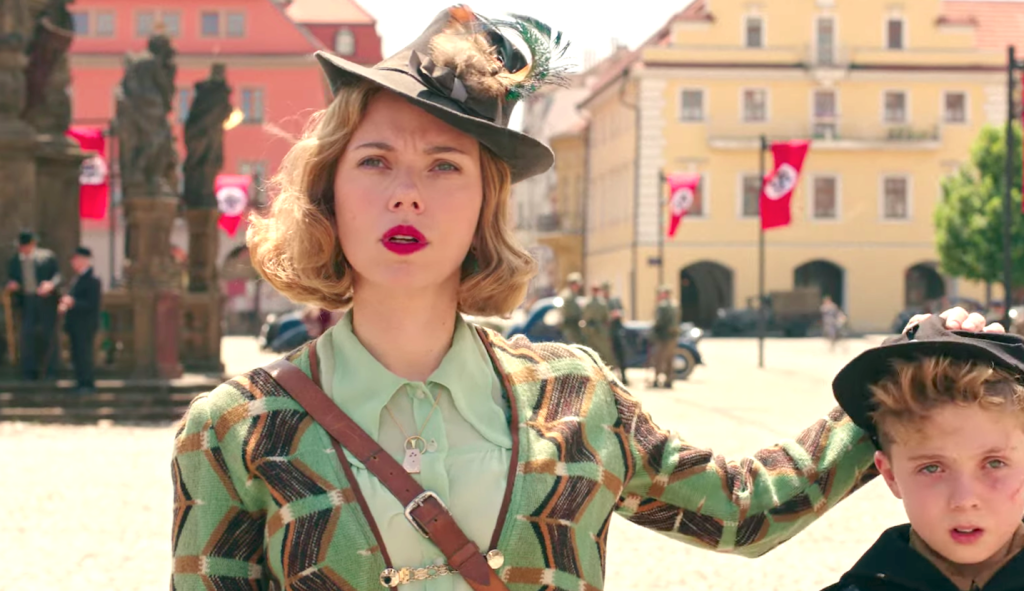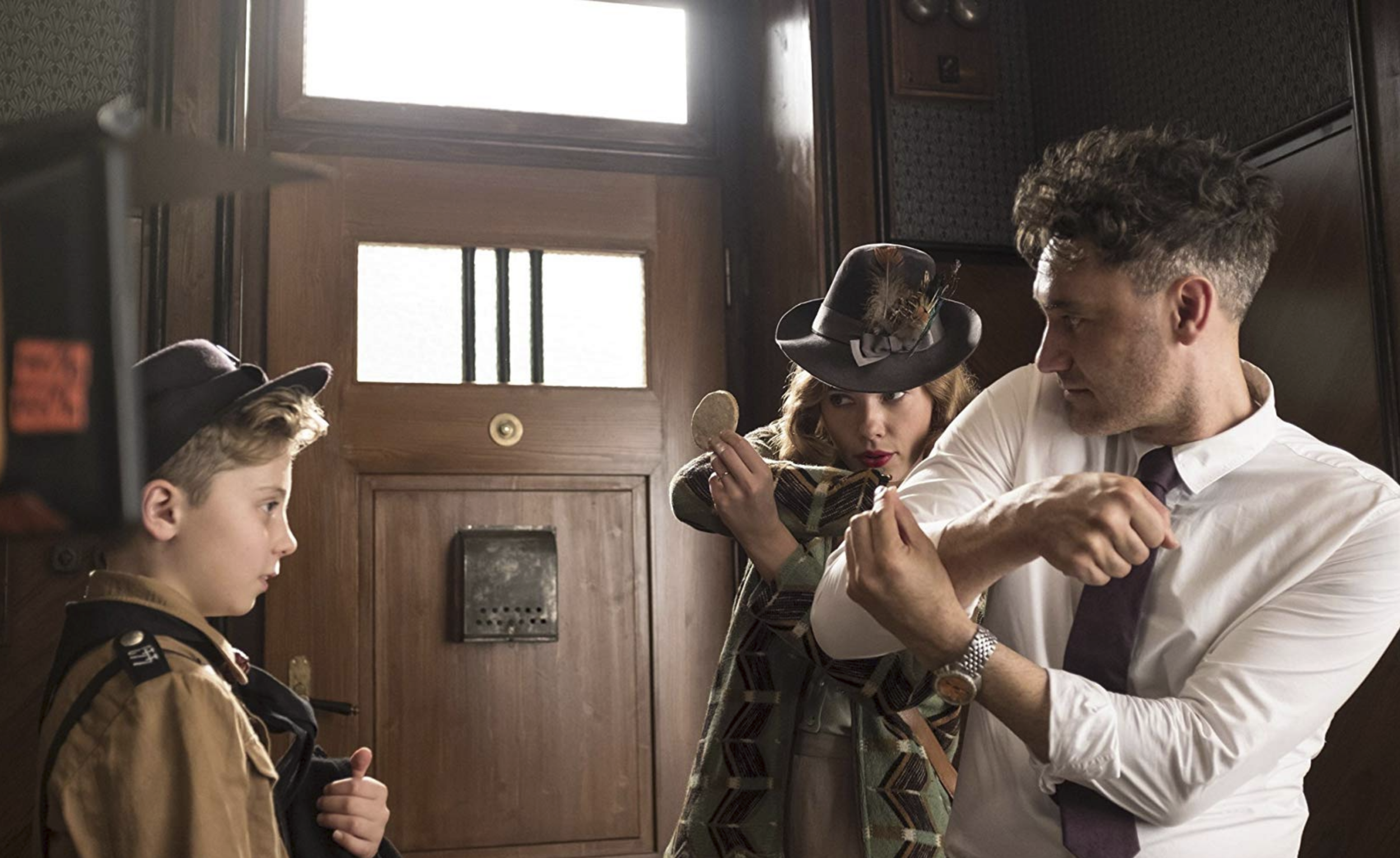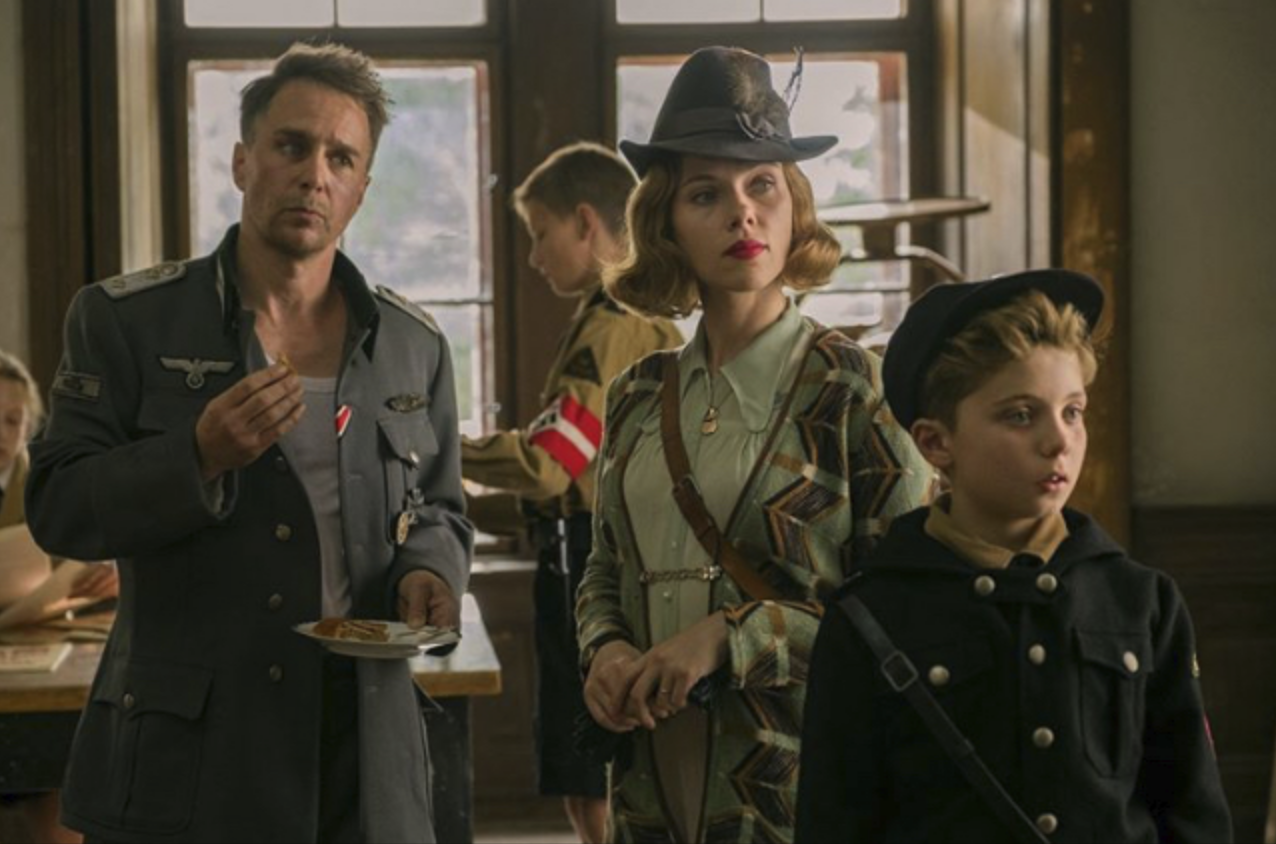Taika Waititi: I AM JoJo Rabbit
Feat. Sam Rockwell, Taika Waititi, and Roman Griffin Davis in Jojo Rabbit (2019) - Courtesy of 20th Century Fox
Interview by Editor-In-Chief, Liberté Grace
Taika Waititi, known for directing Thor Ragnarok, premiered his latest film JoJo Rabbit at the Toronto Film Festival, which just won the TIFF People’s Audience Award. JoJo Rabbit is a Nazi satire and black comedy about a young boy, Jojo, a member of the Hitler Youth played by first-time actor, Roman Griffith Davis, who finds out his mother is hiding a Jewish girl in the attic. Jojo befriends an unlikely imaginary friend - Hitler - played by Waititi, who helps him to confront his blind nationalism.
JOJO RABBIT OFFICIAL TRAILER - Courtesy of 20TH CENTURY FOX SEARCHLIGHT
Waititi gave his creative insights during the film’s TIFF premiere and Q & A sessions into how he approached this controversial subject matter with humour, which Waititi told filmmakers and story-tellers; needs to be highlighted over and over again, to counteract humanity’s continued issues with racism, still ongoing today, despite the atrocities of Nazi Germany.
Q: Where did the story of JoJo Rabbit come from for you?
Taika Waititi: OK, well - real talk - my mum read this book by Christine Mortenson. It's called 'Caging the Skies’. It's about this boy in his youth who finds out his mother is hiding this girl in his attic, who changes his whole worldview. The way she described it, I thought, “What a great film idea!” I read the book, it is incredible, but, it wasn't exactly how my mum described it...
So, when I started writing it, I was tapping more into the way that she thought of explaining this book, which was kind of wrong, but... (I'm not sure she actually read it) then, after years of development; this imaginary friend character came to the story, and a lot more of the humour.
Feat. Taika Waititi, Scarlett Johansson, and Roman Griffin Davis in Jojo Rabbit (2019) - Courtesy of 20th Century Fox Searchlight
The core of that story is about a boy who has been indoctrinated and has to learn to understand (that). The idea was like having a monster in the attic.
Q: There are unwritten rules about what you can or can’t show in movies and what can and can’t be funny. Was there any fear or concern about how to draw that line?
Taika Waititi: Yeah, a little bit. The film, is sort of a love letter to mothers and especially solo mothers. I've got a single mum. I didn't realise until I had my own children, that she would have done anything for me and she did.
That's why Scarlet’s character, for me, is one of the most important elements in the entire film. She is probably the only grounded character and the only one that lives in reality, even though she's a clown. She's trying to save her kid.
For me, growing up, I sort of always fantasised about father figures and wanting their kind of presence in my life. I think it's no different for a boy growing up with a solo mother in Nazi Germany: “I want a dad. But, also, my idol is this buffoon.”
Q. In regards to that moment where Jojo f**k’s off Hitler, can you tell us about your desire to tell this story and to do what you did with this particular moment in history?
Taika Waititi: I'm a fan of World War II. No. My grandfather, technically, fought in World War II, fought Nazis, and I was always obsessed by that as a child. My mother was part of the Russian Jews who came to New Zealand (of all places!). And so, I grew up having a very clear idea of, I feel, what was good and what was bad.
For me, it's important that we continue to tell these stories in very different ways and sometimes you've got to use magic and fantasy, and use imaginary friends and things like that, to keep the story interesting. I think with any story that keeps getting told throughout human history; you always have to embellish, change it up, and make it interesting.
Feat. Taika Waititi and Roman Griffin Davis in Jojo Rabbit (2019) - Courtesy of 20th Century Fox Searchlight
I think we're in danger of, as apathetic humans, getting lazy. Today we’re in danger of forgetting what happened between 1933 and 1945. People say things like, “Not another World War II movie! Oh god, we get it!”
But, we don't. There was a poll that was taken citing a very high statistic in America; they asked American youth what ‘Auschwitz’ meant and only 40% knew what the word was. Less than 100 years since those atrocities, it’s shocking to me and unacceptable. It's not good enough.
Q: Can you discuss the casting of Roman as the main character of Jojo?
Taika Waititi: I've worked with a lot of children: they're the worst! It's true what they say: “Don't work with them.” I just didn't listen for five movies. When I try to find kids to be in these films, for me, the key is finding somebody who embodies the character, that I'm trying to put in the film or that I've written. Roman is one of the most sensitive, loving and engaged people I've met, despite his age, and it just blew me away.
Feat. Taika Waititi and Roman Griffin Davis in Jojo Rabbit (2019) - Courtesy of 20th Century Fox Searchlight
Q: The movie is so funny and at times sad. How did you balance the comedy with the drama?
Taika Waititi: If you've seen most of my films, it's pretty much the same. It's a balance. It takes a lot of time, especially in the edit, to find the balance between comedy and pathos. For me, that's what life is. My life is a mixture of drama and hilarity. It’s never one or the other. I can't make a gritty raw drama and I can't just make it jokey jokey. For me, it has to be a mix. That's what life is every day, for every single person in the world; it’s a mix, and that's my jam.
Q: How do you give endearing qualities to Nazi characters without going too far?
Taika Waititi: As I said, I've always been fascinated by this particular war. Rommel was a great German general. Didn't want to be a Nazi, tried to kill Hitler. So, there were many people who were patriots, but not a part of the party. Humans are humans. They are not evil.
For me, after becoming a father, I really realised that it takes a lot to indoctrinate children, to rear children and bring them up to be assholes. So, I did a lot of research into Hitler Youth. And these kids were encouraged to sell their parents out and reject their advice. They were told it didn't matter whether your parents were a part of the party or not. They were told your father is Adolf Hitler.
Feat. Taika Waititi in Jojo Rabbit (2019) - Courtesy of 20th Century Fox Searchlight
Q: Can you talk about making the final song Heroes by David Bowie?
Well, he is one of my heroes. You probably know the message and theme of the song. For me, it's about JoJo making one small effort at being a hero. He has spent the majority of his life up until that point, at the age of 10 and 1/2, not being a hero; to then making one small gesture towards someone, and helping them escape from his house, to be a hero. For me, that's what the song is all about.
Q: The problem of learned hate hasn't exactly gone away since the Second World War. What does JoJo Rabbit have to say to that problem now?
“ I think in 1933 when Hitler got into power—little by little, every single day, every week, it was just one small change, one small thing that people said, ‘That’s wrong’. But, it wasn’t big enough to really get everyone up and arms, until it became too late.”
Taika Waititi: I feel like today, that's what's happening. They say small little things like: "They get to say what they want. It's only 10 people there who said that. It's only like 200 people at this little march thing."
But, the more you ignore it and the more you think we're at the height of human civilisation and advancement—it'll never happen again, which is exactly what they said in 1933: “Nothing can be as bad as the first World War”—it’s that ignorance, and the arrogance to forget, to allow ourselves to forget, that is a really big human flaw.
Feat. Taika Waititi and Roman Griffin Davis in Jojo Rabbit (2019) - Courtesy of 20th Century Fox Searchlight
So, I think it's really important to tell these stories again, and again. They didn't say “let's never forget” just as a joke. We have to keep remembering and finding new and inventive ways of telling the same story and teaching ourselves and our children how to grow and move forward; unified and with love into the future.
Q: It is possible to unlearn hate?
Absolutely. Yes.
JoJo Rabbit is being released in cinemas in New Zealand and the United States by Fox Searchlight on the 18th of October. You can follow JoJo Rabbit on Facebook and Instagram.
You can follow I AM FILM on Instagram (iamfilmofficial) #IAMFILM #MastersOfFilm and Join our list to receive more news and views by the Masters Of Film in Toronto.
ABOUT THE FILMMAKER
Taika Waititi
Actor, Writer, Director
Taika Waititi is a New Zealand filmmaker, actor and comedian. He was nominated for an Academy Award for his 2004 short film Two Cars, One Night. His feature films Boy (2010) and Hunt for the Wilderpeople (2016) have each been the top-grossing New Zealand film, with the latter still holding that title as of 2018. He co-directed and starred in the horror comedy film What We Do in the Shadows (2014) with Jemaine Clement. In 2017, he directed the Marvel Cinematic Universe superhero film Thor: Ragnarok, in which he also played the character Korg, a role he went on to reprise in Avengers: Endgame (2019). [Source: Wikipedia]










